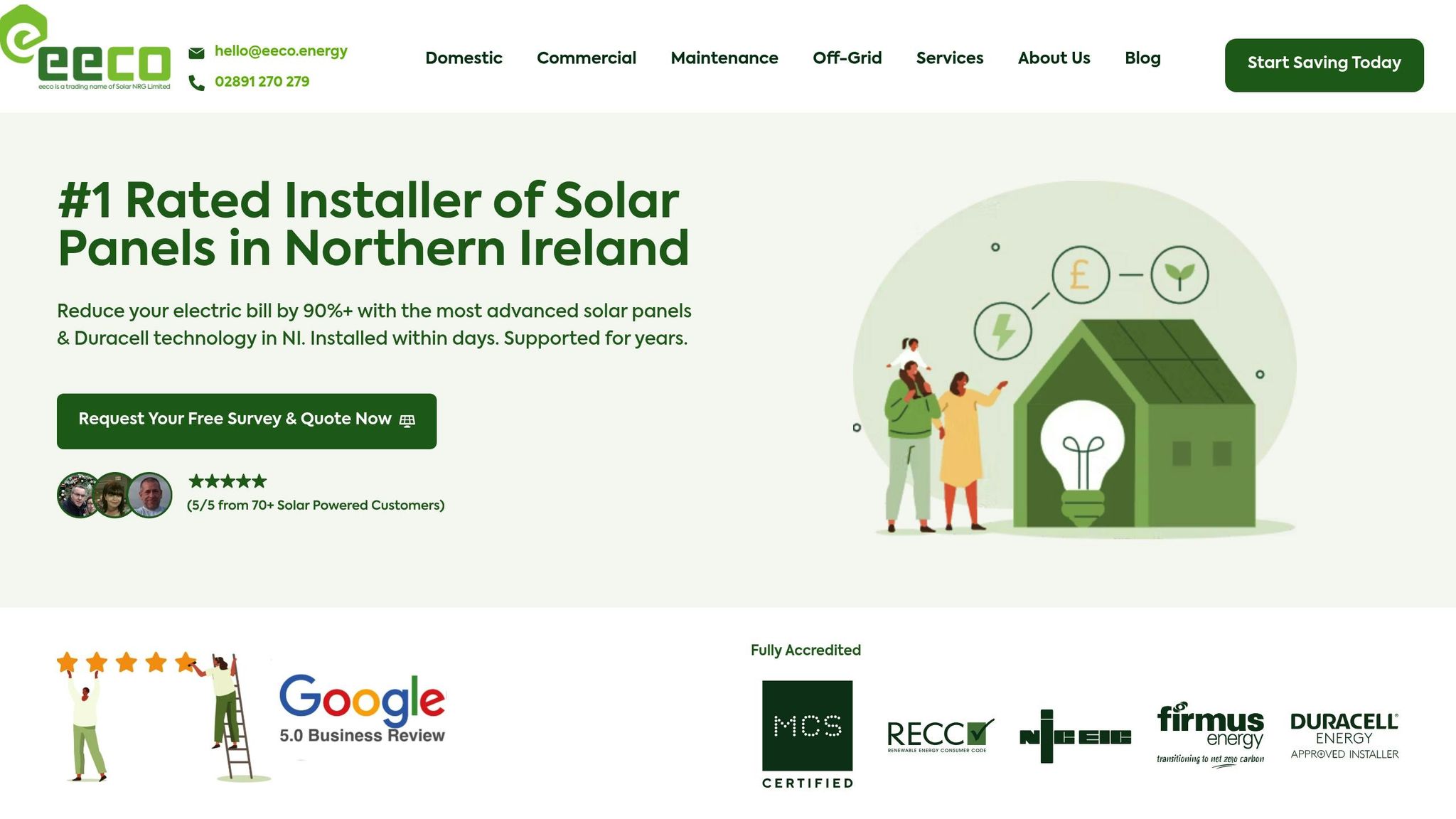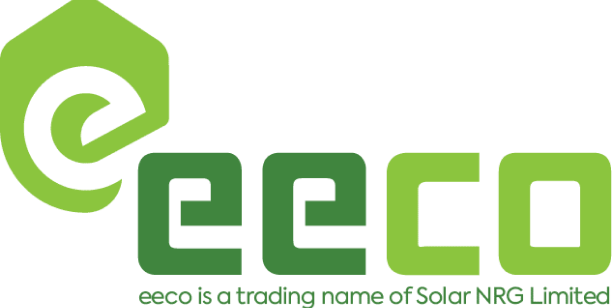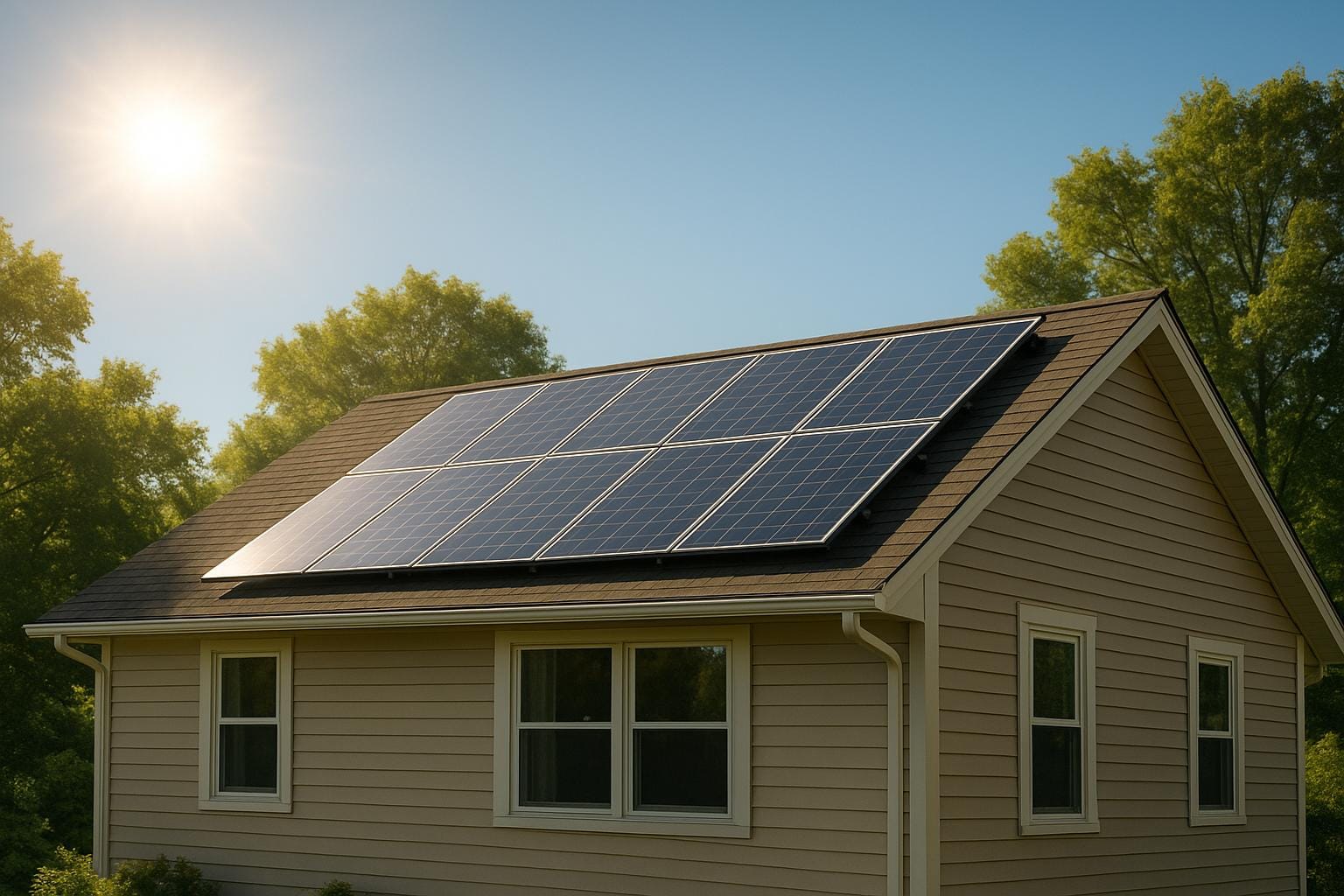Switching to solar energy is a smart way to reduce energy bills and cut carbon emissions. Solar panels generate electricity with minimal emissions, helping households and businesses contribute to a greener future while saving money. Here’s what you need to know:
- Environmental Impact: A typical UK home with solar panels can save 1.3–1.6 tonnes of CO2 annually, adding up to 39 tonnes over 25–30 years.
- Cost Savings: Solar panels lower electricity bills by generating power during the day. Adding battery storage can maximise savings by storing excess energy for later use.
- Government Support: In the UK, solar installations are VAT-free until 31st March 2027, and surplus energy can earn you money through the Smart Export Guarantee (SEG).
- Durability: Modern solar panels retain over 90% efficiency after 25 years, making them a long-term investment.
- Northern Ireland’s Progress: With over 13 GW of solar capacity, the region is advancing towards its net-zero goals by 2050.
Solar energy also supports technologies like EV chargers, smart water heating, and energy-efficient radiators, creating a comprehensive energy solution. With government incentives and reliable warranties, solar power is worth considering for both financial and environmental benefits.
How Solar Energy Cuts Carbon Emissions
Solar energy is a powerful way to reduce carbon emissions because it generates electricity without releasing large amounts of greenhouse gases. Unlike fossil fuel-based systems, solar power offers a cleaner and more sustainable solution. Let’s dive into how it compares to fossil fuels and why it’s a key player in creating a greener future.
The Carbon Cost of Fossil Fuels
Electricity generation using fossil fuels like coal, oil, and natural gas comes at a high environmental price. These fuels release vast amounts of CO2 and other harmful pollutants into the atmosphere. In contrast, once solar panels are installed, they produce electricity with almost no direct emissions, making them an environmentally friendly alternative.
Solar Energy and Northern Ireland’s Climate Goals
Northern Ireland is working hard to meet renewable energy targets as part of the wider UK climate strategy. By increasing the use of locally generated solar power, the region reduces its dependence on imported fossil fuels and bolsters energy security. Every solar panel installation contributes to reducing the overall carbon footprint, helping Northern Ireland move closer to its goal of becoming net-zero by 2050. Real-time monitoring of these benefits highlights just how effective solar energy can be in supporting these efforts.
Tracking Carbon Reductions in Real Time
Modern solar systems come equipped with advanced monitoring tools, allowing homeowners to track their system’s performance and efficiency in real time. These tools provide insights into how much clean electricity is being produced and calculate the corresponding carbon savings. Regular monitoring and maintenance ensure that systems perform at their best, maximising both environmental and financial benefits.
For businesses, larger solar installations offer even greater potential for reducing carbon emissions. These large-scale systems not only align with regional sustainability goals but also contribute to improved air quality and a cleaner energy future for Northern Ireland. The cumulative impact of these efforts is a significant step toward a more sustainable world.
Financial Benefits of Solar Energy
Solar energy isn’t just a step towards a greener planet – it’s also a smart financial move for both homeowners and businesses in Northern Ireland. While the environmental perks are well-known, the monetary advantages are equally compelling, offering immediate savings and impressive long-term returns.
Lower Electricity Bills
One of the most obvious perks of solar panels is the reduction in electricity bills. By generating your own power during daylight hours, you rely less on the grid and avoid paying for electricity from your supplier. Even better, any surplus energy your system produces can be exported back to the grid, earning you extra income through government-backed schemes.
How much you save depends on the size of your solar system and your energy usage. For example, a 4.5kW system that produces 3,380kWh annually can significantly offset the energy needs of an average household. Larger systems, like those between 7.2kW and 9kW, are ideal for properties or businesses with higher electricity demands.
Savings tend to peak during the sunny summer months, but modern solar systems are designed to generate power year-round – even on cloudy days. Adding a battery storage system can take your savings even further by storing unused solar energy for later use, such as during the evening when electricity rates are typically higher. This combination not only reduces your reliance on the grid but also maximises your overall savings.
Government Incentives and Support
In Northern Ireland, solar energy adoption is supported by various government incentives. For instance, domestic solar installations are zero-rated for VAT, which means you avoid the usual 20% VAT charge, reducing the overall cost of the system.
The Smart Export Guarantee (SEG) is another financial boost, allowing you to sell any excess electricity back to the grid. Energy suppliers offer competitive rates, and some even provide higher payments during peak demand periods, creating a steady income stream.
Additionally, programmes like Northern Ireland’s Sustainable Energy Programme (NISEP) have historically provided grants for renewable energy projects. These grants can cut upfront costs by hundreds of pounds, making solar installations even more accessible and improving the return on your investment.
Cost Comparison Table
Here’s a breakdown of typical system sizes, costs, and potential savings to help you visualise the financial benefits:
| System Size | Number of Panels | Annual Generation | Installation Cost | Estimated Annual Savings | Payback Period |
|---|---|---|---|---|---|
| 4.5kW | 10 | 3,380kWh | £3,950 | £800–£1,200 | 4–5 years |
| 5.4kW | 12 | 4,400kWh | £4,350 | £1,000–£1,500 | 4–5 years |
| 7.2kW | 16 | 6,189kWh | £4,850 | £1,400–£2,000 | 3–4 years |
| 8.1kW | 18 | 6,685kWh | £5,700 | £1,500–£2,200 | 3–4 years |
| 9kW | 20 | 7,099kWh | £5,900 | £1,600–£2,400 | 3–4 years |
These figures assume south-facing installations. Actual savings depend on your energy usage, electricity rates, and tariffs.
The payback period shows when the savings from your solar installation will equal the initial investment. Once this period is over, the electricity your system generates is essentially free. With most solar panels carrying 25-year performance warranties, the financial benefits can add up significantly. Over their lifetime, total savings often range between £20,000 and £40,000, depending on system size and energy prices.
For those looking to enhance their savings further, adding battery storage is an excellent option. While this adds an extra £2,400–£3,650 to the upfront cost, it can increase self-consumption rates from around 30–40% to as much as 70–80%. This means you’re making the most of your solar energy while reducing your dependence on the grid even further.
Boosting Energy Efficiency with Solar Technologies
Solar panels are just the starting point for building an efficient, sustainable energy system for your home or business. When paired with complementary technologies, they can significantly increase your energy independence while offering both environmental and financial advantages. These additions turn a simple solar setup into a well-rounded energy solution that operates effectively day and night.
Battery Storage for Greater Energy Use
Without a battery system, much of the solar energy your panels generate could end up being sent back to the grid. Adding battery storage allows you to store excess energy and use it when you need it most.
EECO Energy provides three battery options to suit various needs: the Dyness 10kWh at £2,400, the Soluna 10kWh at £3,000 with added features, and the Duracell 10kWh at £3,650, which offers top-tier performance and robust warranties.
These batteries store surplus energy for use during peak times, helping you cut down on grid reliance. While battery systems require an upfront investment, they can lead to substantial energy savings over time. Plus, they provide energy security during power outages, which is particularly valuable for critical operations.
But battery storage is just one piece of the puzzle – smart home technologies can take your energy efficiency even further.
Smart Home Solutions
EECO Energy offers smart immersion controllers designed to make the most of your solar energy. These devices divert surplus solar power to heat your water tank, reducing water heating costs during sunny periods.
The system works by monitoring your solar production and household energy use in real time. When your panels generate more electricity than your home needs, the controller gradually directs the excess power to your immersion heater, ensuring optimal water temperature without tapping into the grid.
Additionally, EECO Energy installs modern, energy-efficient radiators that integrate seamlessly with solar systems. These advanced radiators use less energy than traditional models while delivering better heat distribution. When combined with solar panels and smart controls, they can help lower heating costs, especially during cooler months when solar generation is still strong.
These automated solutions adapt to your household’s energy patterns, optimising usage without requiring your input. They ensure maximum efficiency and comfort with minimal effort on your part.
Solar-Ready EV Chargers
With the growing popularity of electric vehicles (EVs) in Northern Ireland, integrating a solar-ready EV charger into your system is a smart move. EECO Energy’s EV chargers are designed to prioritise charging during daylight hours, when your panels are producing electricity.
A well-sized solar system can cover a significant portion of your EV’s energy needs, cutting transport costs and relying on clean solar power instead of pricier grid electricity.
EECO Energy’s chargers come with smart features that optimise charging based on solar production, electricity rates, and your driving habits. For instance, they can delay charging until your panels are at peak production or take advantage of cheaper overnight rates when solar energy isn’t available.
By powering your vehicle with solar energy, you reduce dependence on fossil fuels and lower carbon emissions, making your transport as clean as your home energy system. This integration is the final piece of a self-sufficient energy ecosystem.
Together, these technologies create a well-rounded energy solution, ready to meet your needs with EECO Energy’s expertise.
sbb-itb-d2d975a
How to Get Started with EECO Energy

Switching to solar power with EECO Energy is easier than you might think. Their simple, three-step process is designed to help homeowners and businesses across Northern Ireland start generating clean energy while cutting down on energy bills. It’s a practical way to enjoy both the financial and environmental perks of solar power.
Step 1: Free Survey and Quote
The journey begins with a free survey and customised quote. During this stage, you’ll explore system options tailored to your energy needs, including choices for battery storage. The estimates are based on the assumption of an ideal south-facing roof to maximise energy production. Your personalised quote will clearly outline the system details, making it easy to understand what’s included.
Step 2: One-Day Installation
Once you’re ready to move forward, EECO Energy offers a one-day installation service across Northern Ireland. Their MCS-accredited installers will expertly fit your solar panels and integrate any selected energy storage solutions. This efficient process ensures you can start enjoying clean energy without unnecessary delays.
Step 3: Ongoing Support
After installation, you’ll benefit from ongoing support, including a 25-year warranty to safeguard your investment. This long-term commitment ensures your solar system continues to provide clean energy for years to come, giving you peace of mind.
Conclusion: Adopting Solar for a Cleaner Future
Solar energy offers a smart combination of reducing environmental impact and saving money. By cutting carbon emissions and lowering energy bills, it provides a practical solution for households and businesses across Northern Ireland. Instead of relying on fossil fuels, solar panels harness renewable energy right from your rooftop, making a meaningful contribution to a greener planet.
One of the biggest advantages of solar panels is their long-term reliability. As electricity prices continue to rise, solar systems provide decades of predictable savings. EECO Energy’s systems, designed to be cost-effective, can help you save significantly every year. Plus, government incentives make the investment even more appealing. And with a 25-year warranty, you can be confident in the lasting value of your system.
On a larger scale, adopting solar energy contributes to Northern Ireland’s renewable energy goals and climate action plans. Every kilowatt-hour generated locally reduces dependency on imported fossil fuels, moving the region closer to energy independence.
EECO Energy simplifies the process with a free survey, quick one-day installation, and ongoing support. This makes switching to solar easy and accessible for both homeowners and businesses.
Take the step today for lower energy costs and a cleaner future. With reliable technology, extensive warranties, and expert local service, solar energy is a forward-thinking investment in both your finances and the environment.
FAQs
How do solar panels help lower my carbon footprint compared to traditional energy sources?
Solar panels create electricity by converting sunlight into power, all without releasing harmful emissions during their operation. This means they can play a big role in cutting down your dependence on fossil fuels and shrinking your carbon footprint.
In the UK, a typical 4kW solar panel system can offset roughly 1.5 to 2 tonnes of CO₂ annually. By choosing solar energy, you’re not only taking a step towards a cleaner planet but also enjoying the perk of lower energy bills.
What financial support is available in Northern Ireland for installing solar panels, and how does it affect the overall cost?
Homeowners and businesses in Northern Ireland have access to various financial incentives to make switching to solar energy more affordable. One key programme is the Northern Ireland Sustainable Energy Programme (NISEP), which provides grants covering up to 20% of the cost of installing solar panels. This helps to significantly reduce the initial investment required.
Another major advantage is that solar panel installations qualify for 0% VAT. This can translate into savings of hundreds or even thousands of pounds, depending on the size of the system being installed. When combined with the long-term reduction in energy bills, these incentives make solar energy an economical and eco-conscious option.
Can solar panels still work effectively during cloudy weather, and how does battery storage help maximise their benefits?
Yes, solar panels can generate electricity even on cloudy days, though their output might be somewhat lower. This is because they utilise daylight, not just direct sunlight, to produce energy.
Pairing solar panels with battery storage can make a big difference. Batteries store any surplus energy produced during brighter, sunnier times. This stored energy can then be tapped into when the panels aren’t generating as much – like on overcast days or at night. This setup not only reduces dependence on the grid but also helps cut electricity bills and provides a steadier, more reliable energy supply, even when the weather isn’t ideal.


